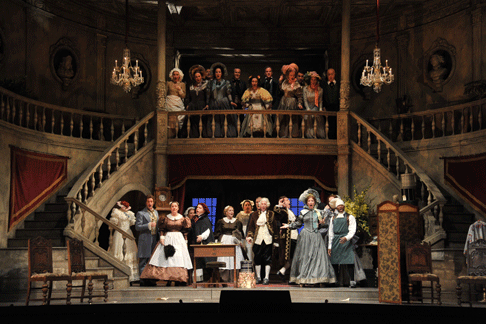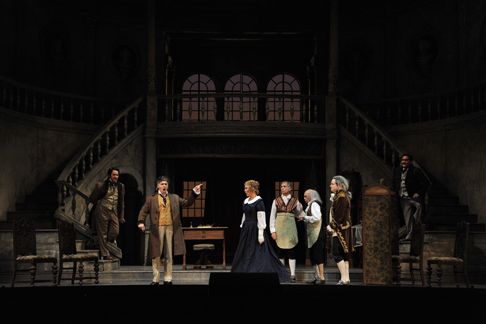The title role and Doctor Malatesta were sung by Ildebrando D’Arcangelo and Corey Crider respectively, each making his role debut in these performances. Soprano Marlis Petersen performed the role of Norina and her beloved Ernesto was taken by tenor RenÈ Barbera. Stephen Lord conducted the Lyric Opera Orchestra with the Chorus prepared by Martin Wright.
During the orchestral prelude to the performance the lines delineating melodies associated with individual characters were nicely shaped. Don Pasquale’s opening monologue, in which he comments on his imminent meeting with Malatesta and plans for his nephew Ernesto, could have been fully appreciated if the orchestra had played its accompaniment less forte. From the start D’Arcangelo’s demeanor and conception of the role of Don Pasquale were not only dramatically but also vocally convincing. Equally suited to his part on both grounds is Corey Crider as Dr. Malatesta. When he describes the bride whom he has found for the aging gentleman, Mr. Crider inflects the word “angelo” with a rich, baritonal resonance while further executing accomplished runs in his aria “Bella siccome un angelo.” Both performers show an inborn sense of comic timing in their delivery of lines and interaction. When left alone Pasquale reveled in the prospects of his “angelic” bride, while Mr. Crider’s Malatesta watched through a curtained window in self-satisfied approval of the forthcoming masquerade. In a subsequent exchange Pasquale’s nephew Ernesto refuses to abandon his beloved Norina although he faces the prospect of disinheritance by the old gentleman. When Ernesto now learns of his uncle’s plan to marry, with the unexpected assistance provided by Dr. Malatesta, his disappointment is unleashed in the aria “Sogno soave e casto.” Barbera demonstrated a sure sense of legato in his approach, whereas individual pitches could be softened in order to express the fervor of Ernesto’s plight.

The following lengthy scene of Act One offered both Ms. Petersen and Mr. Crider the opportunities to delineate their characters through musical decoration. After Norina’s introductory “So anch’io la virt˘ magica,” which Ms. Petersen embellished with exquisite, light touches, Malatesta introduces his plan to fool Don Pasquale. Malatesta quiets her initial misgivings due to Ernesto’s emotional quandary and wins Norina over to the masquerade. As she agrees to play the part of Malatesta’s sister and supposedly marry Pasquale in a contrived ceremony, Norina declares “Pronta io son” at the start of their duet. Petersen and Crider here joined in a bel canto synthesis with Malatesta’s declarations of “Brava” ringing out in decorative anticipation of the comedy to be staged.
At the start of Act Two Ernesto’s well-known scene beginning “Povero Ernesto” was touchingly sung by Barbera. Since he has not yet been informed of the ruse, the nephew laments his loss of Norina and plans to leave Rome forever. Barbera invested his line with a graceful piano on “sorte,” then sang his cabaletta with a spirit of determination. At the entrance of Malatesta with the bride, now named “Sofronia,” Don Pasquale is eager to impress the naÔve maiden. In this production Sofronia concealed herself demurely behind a screen, a hiding place to which Pasquale will later have access when fleeing his bride whom he can no longer control. The trio “Fresca uscita di convento” was used to enhance the comedic exchange and to tempt Don Pasquale yet further. Here Petersen’s runs were especially well executed, in this way using her voice to add to the character’s attractiveness. At the start of the marriage ceremony Ernesto’s arrival nearly spoils the ruse until he is warned off by the clever Malatesta. From this point until the start of the final scene in the opera comedy is paramount for among the principals only the duped Pasquale will continue to take his altered domestic life seriously. The quartet concluding the act showed a transformed Sofronia already making extravagant orders to improve the household, while Mr. Crider’s excellent passagework continued to guide the charade with masterful vocal control.

As Act Three begins the chorus of servants issues its comments on the new lifestyle in Don Pasquale’s domain. Throughout this scene D’Arcangelo showed his talents especially at acting and singing the part of an emotionally wounded signor without resorting in the least to buffo clichÈ. The confrontation between alleged spouses leads to Sofronia proclaiming her momentary dominance with a slap to Don Pasquale’s face. At this point the screen provided refuge to D’Arcangelo’s Pasquale as he sought escape from the wife whose acquaintance he now regrets. The final chapter in the charade is set in motion by Sofronia: upon leaving the house after the altercation with her husband, she drops a note intentionally from a presumed lover in which an assignation at night in the garden is suggested. Don Pasquale, no longer cowed and now furious, seeks out Malatesta for counsel, as the chorus, here quite effectively prepared, comments further on the house gone topsy-turvy. During the meeting between Pasquale and Malatesta, in which the gentleman is once again prepared unwittingly to be fooled, D’Arcangelo and Crider sang a model example of the challenging duet “Cheti, cheti, immantinente.”
The final scene indeed rights relationships as Petersen and Barbera sang an especially moving duet, “Tornami a dir,” in which their voices combined in a rush of emotional commitment. Don Pasquale appears and is compelled, again at the instigation of Malatesta, to give his blessing and financial support to the young couple. Yet in the finale relief and joy were palpable for all, including the now transformed Don Pasquale, at the close of this delightful production.
Salvatore Calomino
Click here for cast and production information.
image=http://www.operatoday.com/DAN_5181.gif
image_description=A scene from Don Pasquale [Photo by Dan Rest courtesy of Lyric Opera of Chicago]
product=yes
product_title=A Noteworthy Chicago Revival of Don Pasquale
product_by=A review by Salvatore Calomino
product_id=Above: A scene from Don Pasquale
Photos by Dan Rest courtesy of Lyric Opera of Chicago